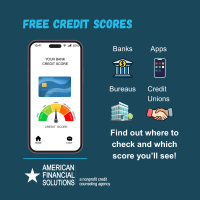Are you feeling overwhelmed by your debts? Do you wish there was a way to get rid of them without having to pay them off? Well, there is – sort of.
In this article, when we talk about debt forgiveness programs, we will be referring to debt accounts such as credit cards, collection agencies, medical debts, old cell phone bills and other unsecured debts. The information provided does not apply to forgiven mortgage[1] debt or college student loans.
Bankruptcy and Debt Forgiveness
In the U.S., there is really only one, true way to have your debts forgiven and that is through a bankruptcy court. Many people ask about the debt forgiveness act, but the reality is that act only applies to mortgages. It is called the Mortgage Forgiveness Debt Relief Act.
The two most common types of consumer bankruptcy are a Chapter 7 and a Chapter 13. In a Chapter 7 bankruptcy, you are relieved of your debts (see those listed above) and in exchange, you may have to give up property you own. In a Chapter 13, you enter into a debt repayment plan for a specified period of time (typically 60 months). After you have consistently made the payments on your debts for the court ordered repayment period, any debt remaining is forgiven. You no longer owe that money.
Settlement and Debt Forgiveness
When you settle a debt, it means you pay off a portion of what you owe to the creditor. If you are using a debt settlement company, you make monthly payments to the company, who then takes your payments and deposits them into a savings account. As you continue to make payments, the funds grow until the debt settlement company feels there is enough money to make a deal with the creditor to forgive a portion of the debt. That may sound very enticing, but that discount in debt comes at a very high cost.
If you are working directly with your creditors to negotiate a debt settlement, you always want to get an agreement to forgive debt in writing. Ask what they plan to do with the forgiven debt – sell it to another collector or report it as taxable income.
It is true that when faced with a customer who may pay nothing on their debt, a creditor may decide to accept a debt settlement. But the consequences for this debt forgiveness option –even if done on your own – are huge. Your creditors may sue you, which may result in your wages being garnished, your bank account being seized, or even in a lien against your property. They may also send your account to a third party collection agency.
If you are thinking about settling a debt, there are certain steps you can take to try and protect yourself. These include:
- Dealing with your creditor directly rather than using a debt settlement company.
- Attempting to come to a settlement agreement with your original creditor, rather than waiting until the debt is sent to a third party collection agency.
- Requesting that the creditor provide you with a 1099 – C form (see below), rather than sending the remaining debt to a collection agency.
- Trying to get any agreements between you and the creditor (or collection agency) in writing.
Debt Forgiveness Consequences
Any type of debt forgiveness (except bankruptcy) may also result in higher taxable income. The Internal Revenue Service considers all or most of forgiven debt or cancelled debt as taxable income, depending on your asset-to-liability ratio (do you owe more than your assets are worth) at the time the debt was forgiven. You will receive a 1099-C tax form from the creditor if $600 or more is forgiven. In addition, creditors may sell the unpaid portion of the debt to a collection agency. The bottom line is that you may still be responsible for repaying part of the forgiven debt.
Other Debt Solutions
There may be many other options available for helping you to repay your debts. A certified credit counselor can help you review your current financial situation and discuss options for working your way out of debt. You can contact a credit counselor by calling the number at the top of your screen or by clicking the Get Started Now button.
[1] Please see our article titled Forgiven Mortgage Debt for information on how forgiven mortgage debt may impact you – positively and negatively.




